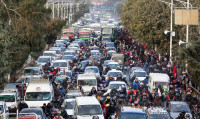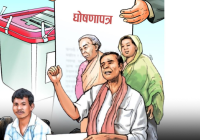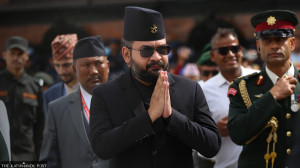Opinion
Imminent economic disaster
Rational planners are unable to use their expertise in the face of irrational politicians’ whims
Khagendra N. Sharma
I am not an economic expert, but even as a general observer, I have sensed an irreversible economic disaster that is going to render Nepal a virtual Indian colony. The economic indicator is the dangerous trade imbalance. I am not good at statistics but I know that our exports fall far short of our imports. And over 80 percent of our imports are from India, while our export to India is quite low. I have no idea how this vast gap is reconciled. Probably most of it is temporarily taken care by the remittance sent by our migrant labourers.
My micro understanding of the economic dynamics is the need for a positive balance in the trade perspective. Who determines this perspective? There are two actors. The first are the economic experts who scan the economic scenario and find out the problems and suggest means of improvement. This is the rationale of the planning machinery, presuming that it is comprised of independent economic experts.
Politics of whims
The second set of actors consists of the political leaders who are in a position to implement the improved economic model. The leaders should have the motivation and the will to implement that model. But in reality the economic experts are not independent. The practice of changing the experts with each change in government has not only kept the planning machinery fettered to the unstable political actors who work on whims rather than any rational basis, but it has also eroded the credibility of the planning machinery as an autonomous entity. Experts and planners cannot use rational discretion against the whims of the political actors.
This ‘politico-expert’ mismatch has resulted in the economic nosedive. I dismiss the theory that our experts cannot analyse the economic malady. But they have either become indifferent to the pressing economic disaster or cannot dare to stand up to their political masters. The political actors, on the other hand, are busy muddying the political waters so that they can reap the cheap political harvest of grabbing the seat of government. They neither have any long-term vision for national prosperity nor are they perturbed by the irrationality of the political manoeuvrings for short-term gains.
Dismal results
Offsetting the economic imbalance needs sustained endeavour. Nepal is still an agricultural country because we never tried hard enough to industrialise it. And even in agriculture, we are going from bad to worse. Until a few decades ago, Nepal was a rice exporting country, but we are now importing the country’s main staple crop, with a staggering amount of borrowed money. Although ours in an agrarian economy, we are shamelessly importing vegetables and fruits for our daily consumption. Our unskilled workforce, which is mostly from the rural areas, is in foreign countries in search of employment that our leaders failed to create at home.
The picture in the urban centres is not any better either. We are one of the least developed countries in terms of industrialisation. The development of industries requires not only technological skills and capital but a stable environment ensuring sustainable policy and support from the national leaders, which have been missing in Nepal. Moreover, during the past few decades, there has been unchecked destabilisation through a series of strikes and extortion of money from the industrialists by different political leaders. Far from enhancing the growth of the industrial sector, many industries have had to close due to the perpetual nuisance.
Despite all these problems, Nepal has been blindly importing consumer goods, including food. Our policy makers give lip service to measures like export promotion and import substitution. Even after decades, these measures are nowhere in sight. Whatever little the private sector has been able to produce cannot compete in the Indian market. So the possibility of correcting the trade imbalance is slim. But the leaders, particularly those in government, are indifferent to these negative pressures; instead they curry favour with the Indian government in order to grab or remain in power. Our leaders are wilfully mortgaging our country into the Indian hands, while our experts are observing this trend with an ominous silence.
Awakening the leaders
I do not want to end this narrative in a negative note. I hope there is still time to reverse the process. But it is difficult. There should be some basic changes in the whole approach. First of all, the political leaders should stop treating politics as their profession for
sustenance and devote their strength in promoting the nation’s interests.
That will pave the way for creating positive vision. Policies of development should be dictated by national, not
party, interests.
Second, correct priorities should be set and followed in determining national goals. Agriculture will need to remain a top priority. The government has a large agro-sector, but it is not demand driven as it is mired in bureaucratic bungling. We have been endowed with one of the best physical topography, capable of adapting to any ecosystem in the world, but we have squandered the opportunities for exploiting our potential. Given a correct approach, we can reduce our dependence on imported foodstuff immediately and produce an exportable surplus in the long term.
Third, rapid industrialisation is the demand of the moment. We should channel all the national energy into promoting industrial growth. Of immediate importance is the need for import substitution in consumer goods. The private sector can play a big role on this front. Next, diversification of production to compete in the international market will boost our economic potential. Needless to say, all this should be supported by the government by aggressively promoting exports.
The economic colonisation by India is imminent unless we do something without delay. But I am shocked that neither the economic experts nor the leaders who run the country seem to be worried about such a danger. I feel the need for intensive debate on this subject among the intellectuals to awaken the sleeping leaders who run the country.
Sharma is a political analyst




 8.12°C Kathmandu
8.12°C Kathmandu










